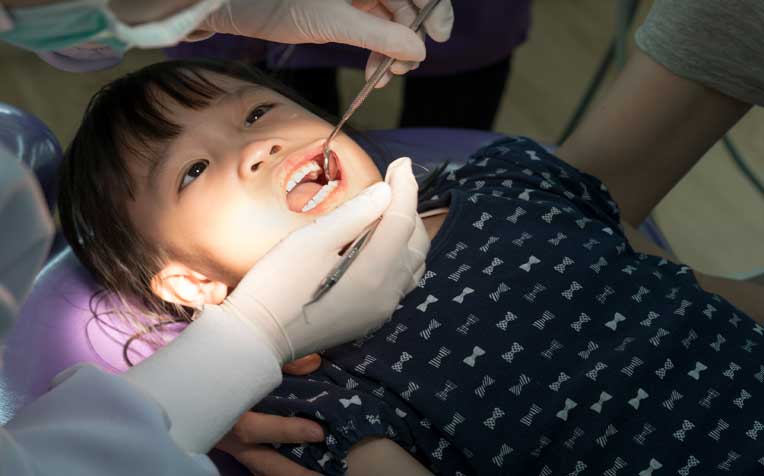
Infants with early childhood caries have a high risk of developing caries in their adult teeth.
Take your child to the dentist from the age of one, recommends the Infant Oral Health Clinic at the National Dental Centre of Singapore (NDCS), a member of the SingHealth group.
Why your baby's teeth matter
A child’s gap-tooth smile may look cute, but a mouth full of decaying milk teeth is no laughing matter. About 40 per cent of preschool children in Singapore show severe tooth decay, caused by a bacterial infection known as early childhood caries. This puts them at high risk of developing caries even when their milk teeth have been replaced with adult teeth. The most likely source of infection is the infant’s mother or caregiver.
Care for milk teeth
Early childhood caries can be spread to the child through saliva from the mother or caregiver who has untreated dental disease. This can happen with sharing of food or cutlery. To address this oral health problem, paediatric dentists at the Paediatric Dentistry Unit of National Dental Centre Singapore (NDCS) set up a clinic dedicated to children and their parents. The Infant Oral Health Clinic at NDCS is the first in Singapore to offer a comprehensive programme which identifies caries risk, monitors oral development, and educates parents and caregivers on caring for their infants’ teeth.
Dr Tan Wee Kiat, Senior Consultant, Paediatric Dentistry Unit, NDCS, said that there is a misconception that baby or milk teeth can be left to decay as they will eventually fall out. Of those preschoolers who have high levels of decay, 90 per cent of the decay is untreated, which implies that parents are not taking their children to dentists for regular checkups. This may, in part, be due to the fact that pre-schoolers do not have access to a school-based dental programme, unlike older children in primary schools.
Oral Health Survey
In 2003, a national oral health survey of 6,000 school children aged six to 18 years, found that only 52 per cent of six-year-olds had no decay in their milk teeth, while 20 per cent had more than four decayed milk teeth. On average, a six-year-old had 1.75 decayed, extracted or filled milk teeth, a 0.27 increase compared to nine years ago. Children with severe tooth decay require extensive treatment, which may involve extraction of the decayed teeth. Prematurely extracted milk teeth have no replacement until the permanent teeth emerge, which usually happens between the ages of six and 12.
Each year, NDCS treats 500 pre-schoolers for early childhood caries. Treatments range from total extraction of all milk teeth to full-mouth restorations. Such treatments are a costly affair. Procedures under general anaesthesia can cost between $1,000 and $2,000 and require the child to spend about one hour or more in an operating theatre. For each operation, in addition to the dental specialist, anaesthetic and nursing services need to be mobilised. “The parents and child undergo unnecessary stress for a condition that can be easily prevented,” said Dr Tan.
A child's first visit to the dentist
American Academy of Pediatric Dentistry now recommends that a child’s first visit to the dentist should be at age one or shortly after the first tooth appears. Said Dr Tan: “It is easier to acclimatise the child to dental treatment when we can start with non-invasive procedures.”
Choosing the right dental professional
- The age of the child.
- It is difficult to get young children to cooperate during dental check-ups.
- The dental professional has to be experienced in assessing a child’s oral health quickly.
- The type of care required.
- The care offered by dental professionalsmdiffers and the choice of professional depends on the complexity of the child’s oral health needs.
- There are oral health therapists, general practitioners and paediatric dentists.
- The treatment needs of the child.
- If the child has existing medical conditions, further assessment may be required by a specialist before starting treatment.
- Being comfortable with the dentist.
- If the child feels at ease, half the struggle is over, and the dental experience will be more pleasant for both parent and child.
- Find out about the professional who will treat your child.
- Singapore Dental Council provides information on qualifications and registration status of dentists in Singapore. Log on to www.sdc.gov.sg
Ref: V10
Contributed by














 Get it on Google Play
Get it on Google Play